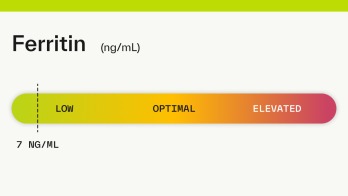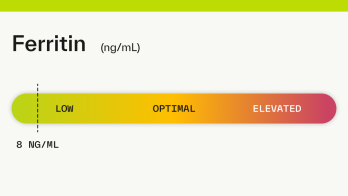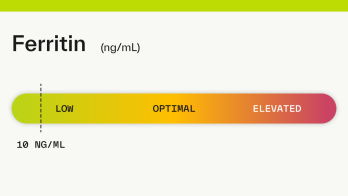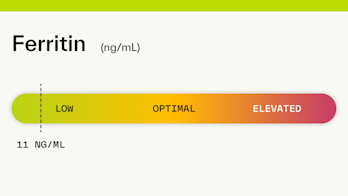Ferritin: 9 ng/mL

What does a ferritin level of 9 mean? Are there any symptoms associated with this level?
A ferritin level of 9 ng/mL is considered low. Ferritin
Symptoms associated with low ferritin include shortness of breath, irritability, fatigue, dizziness, increased hair shedding, and heart palpitations. If you have iron deficiency anemia related to low ferritin, you may also experience chest pain, fast heartbeat, pale skin, cold hands and feet, brittle nails, or a sore or inflamed tongue.
Learn more about what ferritin is and the recommended range for ferritin levels.
Factors that could contribute to a ferritin level of 9
Numerous factors impact ferritin levels, including [ 1
Diet: Diets low in iron put you at greater risk of having low ferritin levels. People who don't eat meat may have a greater risk of iron deficiency anemia if they don't get enough dietary iron from other sources.
Heavy athletic training: Intense physical training may increase your body’s iron needs, which might lead to a drop in ferritin.
Heavy menstruation: Heavy menstrual bleeding increases your body’s iron needs and can lower ferritin levels.
Pregnancy: Pregnancy increases iron needs which can reduce ferritin levels.
Intestinal surgeries: Intestinal surgeries can reduce your body’s ability to absorb iron from digested food, leading to low ferritin levels and possibly iron-deficiency anemia.
GI conditions and diseases: Certain GI diseases and conditions can also decrease iron absorption and cause lower ferritin levels, including ulcerative colitis, celiac disease, Crohn’s disease, colon cancer, and peptic ulcers.
What to do if your ferritin level is 9?
You can naturally boost ferritin levels by increasing your intake of iron from foods
Eat more lean meat. Research has shown that eating lean meat once per day can increase ferritin levels, so if you choose to eat meat, it’s encouraged to eat a variety of red and lean meats [
2
].Pair iron with vitamin C. Vitamin C increases the absorption of non-heme (plant-based) iron. Squeeze lemon over dark leafy greens to increase the iron amount you absorb.
Soak, sprout, and ferment grains and legumes. Soaking, sprouting, and fermenting grains and legumes improve iron availability by lowering the phytates naturally present in these foods that can bind to iron and prevent its absorption [
3
].Cook in a cast-iron pan. Research shows that using cast-iron cookware may increase the iron content in your food by up to 16% [
4
].Consume copper-rich foods. Copper is essential for absorbing iron in the intestines [
5
]. You can increase your ferritin levels by consuming more copper-rich foods, like shellfish, liver, fatty fish, oysters, spirulina, shiitake mushrooms, lobster, and dark chocolate.
Medications and supplements used to improve ferritin levels
Medications
If you have severe anemia in addition to low ferritin, your doctor may recommend intravenous iron to quickly increase your iron levels and help replenish iron stores.
Supplements
If you have low ferritin, oral iron supplements
The most common iron supplements include [ 6
Ferrous sulfate
Ferrous gluconate
Ferric citrate
Ferric sulfate
Generally speaking, ferrous iron supplements tend to be better tolerated and more cost-effective than ferric iron [ 7
How Elo can help
If you want to increase your ferritin levels but are unsure about what type or how much iron you should take, you may want to give Elo Health here
References
What Is a Ferritin Blood Test? What Do the Results Mean? (2017, February 17). WebMD. Retrieved October 4, 2022, from
https://www.webmd.com/a-to-z-guides/ferritin-blood-test
Herran, O. F., Bermúdez, J. N., & Del Pilar Zea, M. (2020). Red meat and egg intake and serum ferritin concentrations in Colombian children: results of a population survey, ENSIN-2015. Journal of nutritional science, 9, e12.
https://doi.org/10.1017/jns.2020.5
Gupta, R. K., Gangoliya, S. S., & Singh, N. K. (2015). Reduction of phytic acid and enhancement of bioavailable micronutrients in food grains. Journal of food science and technology, 52(2), 676�–684.
https://doi.org/10.1007/s13197-013-0978-y
Kulkarni, S. A., Ekbote, V. H., Sonawane, A., Jeyakumar, A., Chiplonkar, S. A., & Khadilkar, A. V. (2013). Beneficial effect of iron pot cooking on iron status. Indian journal of pediatrics, 80(12), 985–989.
https://doi.org/10.1007/s12098-013-1066-z
Reeves, P. G., & DeMars, L. C. (2004). Copper deficiency reduces iron absorption and biological half-life in male rats. The Journal of nutrition, 134(8), 1953–1957.
https://doi.org/10.1093/jn/134.8.1953
Office of Dietary Supplements - Iron. (n.d.). Retrieved October 6, 2022, from
https://ods.od.nih.gov/factsheets/iron-healthprofessional/
Chen, C. (2019, September 1). Enhancement of Dietary Content of Iron in Brassica oleracia Through Soil Alterations. International Journal of High School Research, 1(2), 30–33.
https://doi.org/10.36838/v1i2.7





